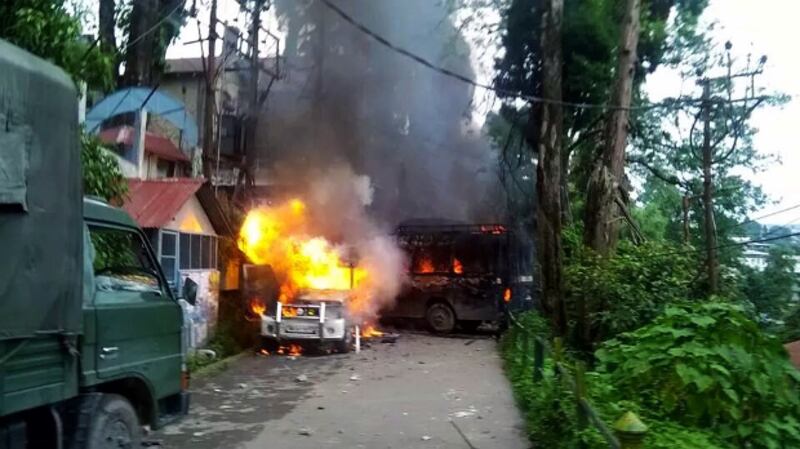A decision by West Bengal’s government to make Bengali instruction compulsory in schools has unleashed violent protests in the hills of the Indian state, with Nepalese-origin residents Thursday calling for a strike to back their demand for a separate state.
Leaders of the Gorkha Janmukti Morcha (GJM) political party called for an indefinite strike in Darjeeling, a popular tourist destination with a large Nepalese population, after police raided its offices early Thursday and seized what officials had described as a huge cache of weapons.
“The strike will continue until the government gives in to our demand,” GJM General Secretary Roshan Giri told BenarNews, urging tourists not to visit the state’s tea-producing hill district.
A few people were injured after GJM activists protested the raid and clashed with security forces in Darjeeling, police said.
GJM is spearheading a decades-old movement for a separate Nepalese-speaking Gorkhaland.
Although India’s almost 5 million-strong Gorkha population has been demanding separation from West Bengal for more than a century, the latest cycle of protests erupted on June 8 after the ruling Trinamool Congress (TMC) party decided to make the Bengali language mandatory in the state’s classrooms in mid-May.
“A separate state for Gorkhas is the only solution,” Giri said. “It is the demand of all Gorkhas living in India. We have written to the Indian government to intervene.”
The people of Gorkha ethnic origin are demanding a state separate from West Bengal on the basis of stark linguistic and cultural differences, Giri said.
The state government, however, said that giving in to the Gorkhas’ demand was “out of the question.”
“We are taking every possible step to contain the situation in Darjeeling, which is an integral part of West Bengal. We will not part with even an inch of it,” Gautam Deb. Paritosh, the state’s tourism minister, told BenarNews.
“These protests are against the interest of the people of West Bengal,” he said.
Since the new policy was announced by West Bengal’s education minister in May 15, Mamata Banerjee, the state’s chief minister, has since come out with a statement “clarifying” that Bengali instruction would be optional in schools in Darjeeling, according to a report in the Indian Express on June 8.
But supporters of the Gorkha movement said separation from West Bengal still was necessary.
“We are still referred to as Nepalis in several parts of India. We need a separate Gorkhaland to have our own identity in the country,” Puran Gurung, a Mumbai-based software professional, told BenarNews.
“We are not asking for separation from India. We only want separation from West Bengal because there is nothing common between the Bengali culture and language and our culture,” Gurung said.

Police said supporters of Gorkha Janmukti Morcha (GJM) burned these police vehicles in Darjeeling, West Bengal, June 8, 2017. [B. Mukharjee/BenarNews]
Arrows, crossbows and axes seized
While condemning the violence in the state, political analyst Saumitra Mohan said the merits for a separate state for Gorkhas should be debated amicably.
“What should be considered is how well the state is administered and how viable such a new entity can be, economically and geographically,” Mohan wrote in her blog.
Binay Tamang, GJM’s assistant general secretary, described the police raid as part of excesses committed against the party’s democratic movement.
“They found a few bows and arrows, rusted spades and firecrackers — all tools found in local households,” he told BenarNews on Thursday.
He said the party was organizing its traditional archery competition when the police confiscated the arrows.
Anuj Sharma, West Bengal police’s additional director-general, told a news conference on Thursday that officers seized sophisticated crossbows, kukris and axes, among other items during the GJM raid in Patlaybas, near the party chief Bimal Gurung’s house.
“The GJM is trying to mislead people by claiming that the weapons seized were part of the traditional local culture,” he told reporters. “It is not true. The weapons were stockpiled to resist and attack the police.”
Local journalists said Bimal and other GJM senior leaders have been hiding since the raid.
GJM General Secretary Roshan Giri said the Darjeeling issue required a political solution that should be decided through a tripartite meeting including officials from West Bengal and the Indian capital, New Delhi.
“The prevailing situation in Darjeeling is not a law-and-order situation,” Roshan told a news conference. “It is a political problem.”
